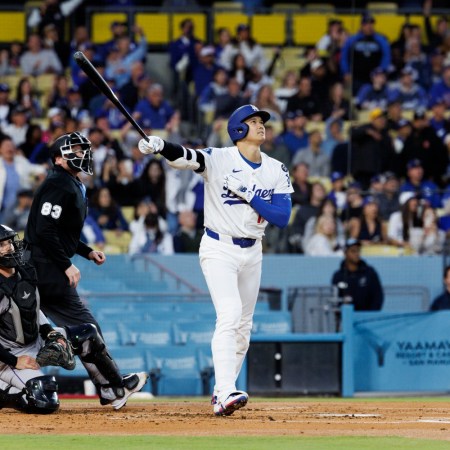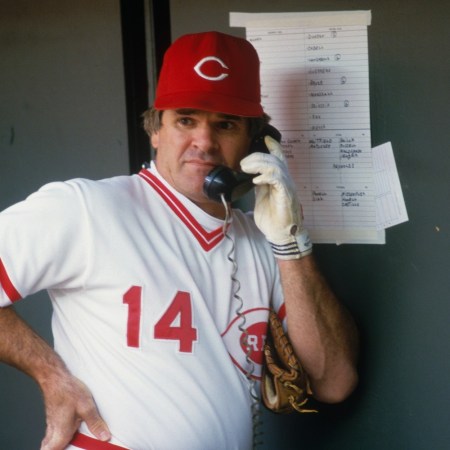Did you know that 2011 Pro Football Hall of Fame inductee Deion Sanders was a New York Yankee?
If you did know that Sanders, who slashed .178/.247/.306 and stole just nine bases in 11 attempts in 71 games combined during the 1989 and 1990 seasons, started his MLB career with the Yanks before going to suit up for the Braves, Reds and Giants, kudos. If you didn’t, it may at least partially be because the Yankees didn’t want you to.
For the Yankees, a ballclub that went 141-182 during the two years Sanders was a member of the Bronx Bombers, the ’90 campaign was particularly painful, as that season was messy both on the field and off with team owner George Steinbrenner suspended by the league for his actions toward star player Dave Winfield, outfielder Mel Hall (who is now in prison) openly dating an underage high school girl and righty pitcher Andy Hawkins tossing a complete game no-hitter — and somehow losing to the White Sox 4-0.
Steinbrenner, Winfield, Hawkins and Hall, as well as his victim, are all featured in the new three-part docuseries Bronx Zoo ‘90: Crime, Chaos and Baseball, which is now available to stream on Peacock. Director DJ Caruso, a lifelong Mets fan from Connecticut, based the show on a series of articles from New York Post columnist Joel Sherman he read during the pandemic when there were no live sports and found compelling. Ahead of Bronx Zoo ‘90 dropping, we spoke to Caruso about the project and how it came to fruition.
Legendary Yankee Outfielder Bernie Williams Is Making Wine Now
Williams crafted and blended a new release with Millbrook Vineyards & WineryInsideHook: Was attempting to document a pre-internet season from more than three decades ago difficult?
DJ Caruso: There was a lot of research. Unlike The Last Dance, where someone documented that season for the Bulls and they had a goldmine of footage, we had to really dig up people and reporters who remembered this story. It was just a different time. We’re so used to all the electronic gathering we get now. It just didn’t exist back then, so there was a lot of deep diving into finding things.
IH: Would this 1990 team have been more memorable now if the internet and social media existed back then?
DC: In today’s era, you get a minute-by-minute report of the train wreck as it’s happening. Who showed up late? Who brought cougars into the locker room? [Editor’s note: Hall did.] All that stuff would be immediately accessible right? All those things would be tweeted out or posted on Snapchat. Back then, it all took much more time. Beat reporters like Joel Sherman would befriend the players and get their trust. It was just a slow burn. The 1990 Yankees would’ve been under a microscope. If they had a year this bad now, I don’t think a lot of these exploits would’ve happened.
IH: There are plenty of infamous sports teams, including the ’86 Mets. Why aren’t the ’90 Yankees on that list?
DC: It’s a good question. If you’re a Yankee fan, you’d know about them. But if you look at the Yankees, they’ve become this global phenomenon. They’re the biggest sports franchise and I think they were the first team to have their own sports network and create their own content and propaganda, in a great way. They never touched 1990. Our owner got kicked out of baseball. We had a pedophile in the locker room. There’s no way. If you’re young, you’re getting introduced to it for the first time because it’s not anything the Yankees or baseball want you to know that much about.
IH: Was there one story from the season you unearthed for the series that particularly stood out to you?
DC: When I finally met Mel Hall’s victim, she was incredibly strong and healthy with three kids. I was really impressed by that. One of the surprise stories for me was the one person in the world who gave her worldly advice was Donald Trump. She met him on the street and he basically asked her, “What are you doing with this guy? Do you need help? Can I get you out of this?” To think Donald Trump at that time would’ve been this voice of morality was a huge surprise. It’s interesting to me Trump would notice this relationship when a lot of people didn’t. It was not appropriate and he pointed it out to her. I thought that was a real surprise.
IH: How did you balance telling stories like Hall’s with detailing some of the lighthearted stories of the ’90 team?
DC: Baseball parallels life. It’s a very difficult sport. You deal with adversity and injuries and if you get a hit one out of three times, you’re a superstar. If I was making a film that wasn’t a documentary, Don Mattingly would have been my Tom Hanks and Mel Hall would have sort of been the bad guy. It really is treating them all as humans and combining those stories. That’s what I think makes this docuseries special. If you don’t like baseball, there’s enough in there from a character standpoint and things that happen to grab onto. If you love baseball, you’re going to see Deion play against Bo Jackson. You’re going to see a no-hitter where the Yankees lost. It’s a baseball story, but there are a lot of interesting characters so it’s a human story as well.
IH: After the ’90 season, the Yankees won four titles in 10 years. Did bottoming out almost help them in a way?
DC: I think that’s really the universality of it to me. Basically, they were the worst of the worst, hit rock bottom and made a lot of mistakes. There are a lot of people who are culpable for things that happened. The dynasty stumbled, but the franchise got back up, repaired itself and ended up winning. Just like Mel’s victim, Chaz, who ended up turning her life around. I think there are some good parallels with the phoenix rising from the ashes. We didn’t want to just dig up dirt on all these things, We wanted to see what happens when you face this kind of adversity and show you can still achieve success.
The Charge will help you move better, think clearer and stay in the game longer. Subscribe to our wellness newsletter today.


























